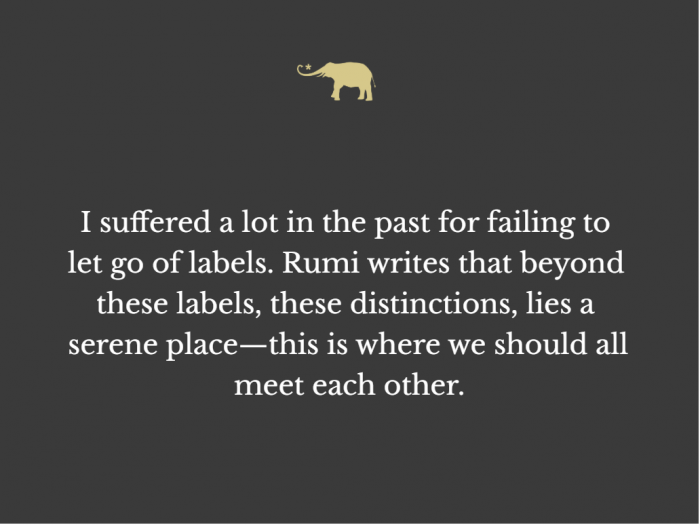Rumi is my teacher.
He helps answer the questions that bewilder us. He dresses experiences with words. He makes it easier for us to understand matters of the heart, the mind, and the soul.
Before delving into his poems, I thought Rumi only spoke of love—due to his eminent love story with Shams Al-Tabrizi. And while he nailed those love poems, he also spoke beautifully about spirituality. When he spoke of love and separation, he did so in such a spiritual manner that I was floored.
Rumi is a poet. But he is also a significant spiritual teacher.
It’s difficult for me to choose just one Rumi poem as supreme, but there is a poem that resonates deeply for me and my spiritual growth. I first read it in The Essential Rumi, a compilation of his poems translated by Coleman Barks.
The poem is called “A Great Wagon,” and the middle verse—my favorite—is below:
“Out beyond ideas of wrongdoing and rightdoing,
there is a field. I’ll meet you there.
When the soul lies down in that grass,
the world is too full to talk about.
Ideas, language, even the phrase “each other”
doesn’t make any sense.
The breeze at dawn has secrets to tell you.
Don’t go back to sleep.
You must ask for what you really want.
Don’t go back to sleep.
People are going back and forth across the doorsill
where the two worlds touch.
The door is round and open.
Don’t go back to sleep.”
This verse highlights three pivotal ideas: the realization of the spiritual realm, and the exploration of non-judgment and oneness.
Some people underestimate spirituality or see it as a trend, but as Pierre Teilhard de Chardin said: “We are not human beings having a spiritual experience. We are spiritual beings having a human experience.”
Rumi explored that truth in his poems. We don’t just live in the spiritual realm, but we are the spiritual realm. To see beyond our physical bodies and realize our true essence has been our purpose since the beginning of time. Rumi wrote about it eight centuries before the extensive spread of spirituality.
Additionally, Rumi establishes a firm reality: black and white are man-made. We are familiar with the beautiful and the ugly, the good and the bad, the true and the false. However, below the surface of black and white, there is a gray space we fail to see—a space void of conflicts.
We tend to judge the situations that occur in our life. We label the things we don’t like as “bad” and call the ones we like “good.” Our dualistic mind sections off emotions, thoughts, and events—and we automatically follow it. This mental division is often the main reason behind our inner and outer conflicts.
In this field, which is void of labels and judgments, there is absolute connectedness. As he puts it, even the phrase “each other” won’t make any sense anymore when we realize our oneness with everything and everyone else. In our own minds, we think we are separate from others, from animals, from nature. The truth is, we all stem from one source of energy.
But we can never truly realize this oneness without letting go of judgments first. Seeing every living being as part of us is a step toward gaining a higher realization that doesn’t know opposition.
I love, and connect with, this poem because of how Rumi weaves these ideas together. We must first let go of judgments before we can enter the spiritual realm and realize our “oneness.”
Thanks to Rumi, whenever I find myself quick to judge or label, I take a moment, create space in my thoughts and remember to head to that field. That is where I become one with everything and everyone.
Because when I see the world as separate, I only limit my own potential.


 Share on bsky
Share on bsky






Read 57 comments and reply